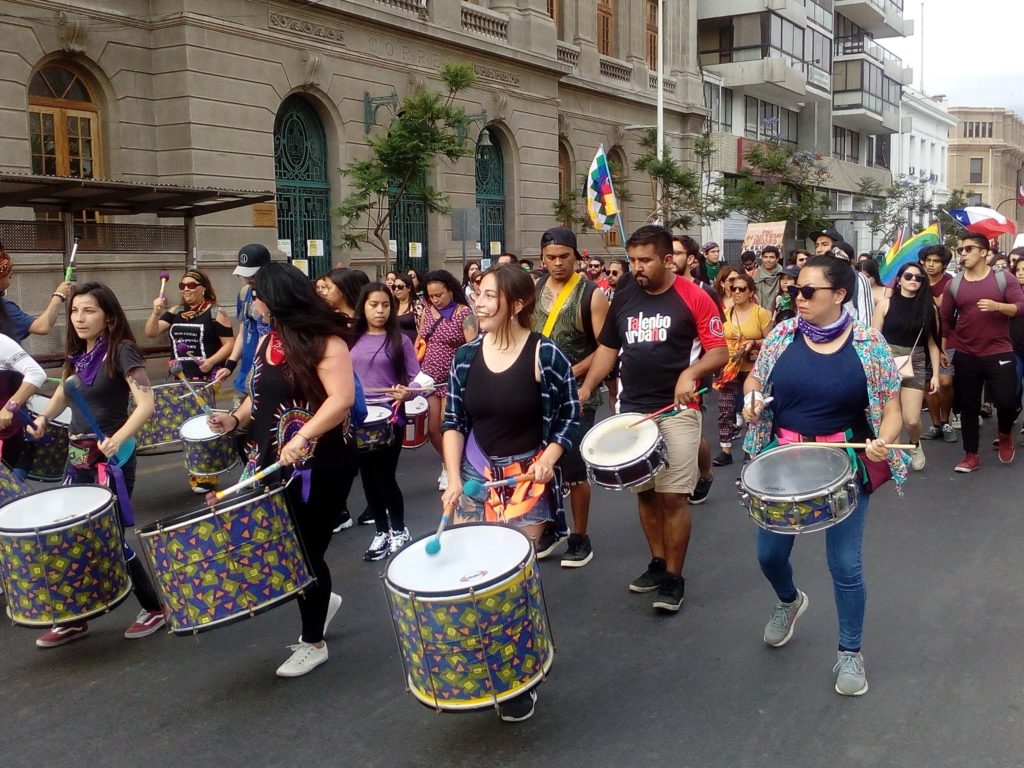The streets of Santiago and other cities in Chile are still being held by thousands of people, who refuse to stand down in the face of ongoing repression and the agreement signed between the government and opposition parties to demobilize the protest movement. The “Agreement for Social Peace and a New Constitution” doesn’t guarantee either, and is a demonstration of how the political class continues to turn its back on the population.
On November 14th, political parties from across the spectrum, with the exception of the Communist Party, came to an agreement which would trigger a plebiscite in April of 2020, in which the population will vote on whether or not they want a new Constitution, and determine whether the constitutional assembly would be half parliamentarians ad half elected through a separate process, or whether all should be elected. A two thirds majority would be needed by the assembly to approve any proposals.
On the left, the Socialist Party (PS) signed the agreement, as did the Democracy Party (PD), Democratic Revolution (RD) and the Broad Front (FA). Many leaders deserted the latter, as they felt that the agreement “is against the essence of the demands that the different and diverse mobilizations have enunciated in the streets.”

As is taking place in key conflicts in Latin America, it has been Indigenous people and feminists who have named what is taking place in the clearest way.
A communiqué from the 8M Feminist Coordination rejects impunity and states: “This agreement saves a criminal government, which has governed with blood stained hands during a crisis of its own creation.” The feminist communiqué points to President Sebastián Piñera as the person responsible for the dead, the mutilated, and victims of political sexual violence, torture, kidnapping and disappearances. Since protests began, nearly 300 protestors have lost eyes, often after being shot with rubber bullets or tear gas canisters at close range by police.
The feminists are clear that a constitutional process in these conditions “is a new congress designed by the same political parties that caused this crisis and who have been overseeing the increasing precariousness of our lives.” They believe that the final objective of the agreement is to get people off the streets to “turn us into spectators again.”
The Mapuche view has been expressed through at least three different organizations: the Mapuche Territorial Alliance, the Koz Koz Mapuche Parliament, and the media collective Mapuexpress.
Mapuexpress keeps tallies on the injuries caused by the repression, highlighting sexual violence and torture. They thus highlight that the “peace accord” was signed in a context of state terrorism, through the application of a Pinochet era Interior Security Law. The greatest risk is that the political and corporate forces that supported the dictatorship and kept the majority of the parliament since the transition to democracy in 1990 will end up being the ones who write the new Constitution.
The name of the Koz Koz Mapuche Parliament commemorates the historic encounter the Mapuche communities had in Panguipulli (Valdivia province), shortly after the Chilean war of occupation of their territory. Their November 17 communiqué states that the agreement “bets on demobilization and distances the possibility of real changes.”
The Koz Koz Mapuche Parliament says in the statement that the aim of elites is to confuse social movements, “to create a base through which to continue usurping power.” For its part, the Mapuche Territorial Alliance has called for the construction of an Assembly of Nations and Movements, which could be similar to the Popular and Indigenous Parliament of Ecuador, as it is being proposed as a space of permanent articulation between social organizations.
There’s no doubt that Indigenous peoples and feminists are changing the old political culture in a deeper way than ideological debates are. Their impact is strong, and it is not easy to measure. We can see that the Mapuche flag is often flown in demonstrations, and that nobody accepts depending on hierarchical organizations, nor do they bow down to caudillos.
Anti-patriarchal women and Indigenous peoples are teaching us the value of collective leadership, rejecting not only traditional leftist leaders (caciques de izquierda) but also political parties and vanguardism.
The priority for organized and mobilized people is to build spaces that are safe and autonomous, based on face-to-face relationships and mutual trust, which is much more important than abstract programs written by the same caudillos who, when the time comes to act, cast them aside. The open town halls are a step in the direction of autonomy.
As we’ve learned from Silvia Rivera Cusicanqui, Rita Segato, María Galindo and Mujeres Creando, as we’ve learned from the Confederation of Indigenous Nationalities of Ecuador (CONAIE) and Ecuadorian women, an explicit rejection of the culture of macho-vanguardism is afoot.
Since the Zapatista uprising we’ve been debating if you need to take state power to change the world. Women have continued to push that debate forward ever since. An anti-patriarchal and anti-colonial politics is being born.
Translated by Toward Freedom, with permission from the author, the original article was published in Spanish by La Jornada. Read the three communiqués mentioned in this article at this link.
Author Bio
Raúl Zibechi is a Uruguayan journalist and popular educator who accompanies grassroots processes in Latin America.
